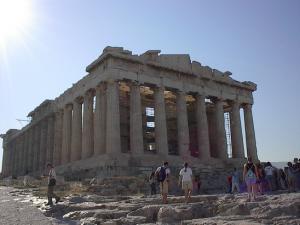 Is there value to discussion when you already hold to the truth?*
Is there value to discussion when you already hold to the truth?*
The classical model of Orthodox education assumes this is so: catechism for the Church, dialogue for the school. If we are wrong, we wish to know so, but if we are right, then honest wrestling with great thinkers will deepen our true opinion into godly Faith. By God’s good grace, we may come to knowledge. Meanwhile, honest interaction will (at least) provide a forum for showing our true beliefs in the best light to those who do not yet hold those ideas.
We do not proselytize, but witness by our fearless confidence in the ability of Truth to defend Himself. If we follow the discussion (the logos), wherever that dialogue leads with honesty and clarity, we have faith that this will end in the Logos Himself, the Lord Jesus Christ. This dialogue results in many weary souls finally being able to hear God’s still, small voice for themselves.** Seek and you will find and to the one who has much, even much true opinion, even more will be given.
Our temptation, if we are fairly certain we are right, is to state (what is to us) obvious and move on. Sometimes this might be proper with an interlocutor with no interest in honest dialogue, yet we must be careful not to be that interlocutor. We invite our neighbor to “come and see” and then demand that they immediately see all that we have seen! This also prevents our deepening our own surety of the truth or adding corollary truths connected to that truth. A deeper knowing following hard discussion may not change our minds on the original topic, but usually gives us new insights in the application of that knowledge!
Everyone in a relationship knows the difference between knowing and this deeper knowing. I know Hope, but she is a person not merely a proposition. If I love her, then I certainly will learn all the truths about her nature that I can. This is true: “Hope loves band music.” However, as a person Hope does not love band music always and at every volume. Suppose if asked, before a night out, what music Hope loves. I could rightly say: “Band music” and just walk away, yet this would be a mistake. I should interrogate my true opinion in this application of that opinion. If I play some of her favorite concert pieces at the wrong time or place (from her perspective), then my truth may even harm me. Sousa is good, but not in some romantic settings. Sadly, this truth was won by hard experience.
To avoid dishonest dialogue, I often will start and end a class with what I think is true. However, I will caution that we must examine this text or philosophy with clarity. We must see what is being said and why some souls, created in God’s image, have found virtue in that text. This very process is education. Saint Basil did not think Homer could replace the Gospels. He did see that a young person’s examination of these texts could reveal streams of virtue or excellence. After all, the world of truths is not exhausted in even the best catechism! We might gain new truths, other virtues. Additionally, our understanding of the truth may be flawed and the honest, fearless interaction with Homer might reveal those flaws. Finally, our fearless quest for truth in Homer might bring those who love Homer, but do not yet love the Gospels, to consider Christ Jesus.
When two different, but good voices combine, there can be a harmony of greater beauty than what each could do separately. When I come to Plato, I come with what I think is a truth greater than he could know: the revelation of God in Christ. However, I do not warp him into believing that Truth. He could not and did not know the Incarnation. Instead, I am patient. I wait to see what he has seen. I consider what he taught. I dialogue with this great Hellene and only after great effort, having gained all that can be gained, introduce the Athenian to Saint Paul on Mars Hill.
Saint Dionysius the Areopagite pray for me! This man, who knew some truths but was willing to listen to new ideas, found Jesus in the wise words of a Jewish sage. As a result, classical, Orthodox Christian education was born.
 The honest dialogue between Athens and Jerusalem birthed the Hagia Sophia.
The honest dialogue between Athens and Jerusalem birthed the Hagia Sophia.
*This question comes at the end of a discussion on “true opinion” and “knowledge” in Plato’s Republic at the College at Saint Constantine. I think most of us (God willing) began with the true opinion of the Orthodox Church on some of the topics in the discussion. We left with better questions about our “true opinions” and a new regard for the truth. I, at least, did not change my mind, but found the process bracing as usual!
**I am, of course, assuming for the moment that we have true opinions. In so many areas (even in Church life), we will discuss an idea that we think is “Orthodox” and are mistaken about the teachings of the Church. There also is the possibility, that every man believing a minority opinion (such as Orthodoxy) must face that he is wrong. This is best faced with a fearless love of truth. No idea that can only survive by intellectual cowardice is worth consideration and will not thrive over time in any case.












